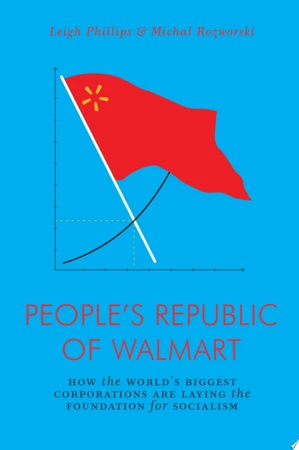The People's Republic of Walmart – How the World's Biggest Corporations Are Laying the Foundation for Socialism

Blurb
Since the demise of the USSR, the mantle of the largest planned economies in the world has been taken up by the likes of Walmart, Amazon and other multinational corporations For the left and the right, major multinational companies are held up as the ultimate expressions of free-market capitalism. Their remarkable success appears to vindicate the old idea that modern society is too complex to be subjected to a plan. And yet, as Leigh Phillips and Michal Rozworski argue, much of the economy of the West is centrally planned at present. Not only is planning on vast scales possible, we already have it and it works. The real question is whether planning can be democratic. Can it be transformed to work for us? An engaging, polemical romp through economic theory, computational complexity, and the history of planning, The People's Republic of Walmart revives the conversation about how society can extend democratic decision-making to all economic matters. With the advances in information technology in recent decades and the emergence of globe-straddling collective enterprises, democratic planning in the interest of all humanity is more important and closer to attainment than ever before.Book summary
Who should plan for whom? Leigh Phillips and Michal Rozworski give an enjoyable introduction to the history of economic planning and the surrounding debates. Starting from the socialist calculation debate, in which Austrians and neoclassical socialist economists were pitted against each other in a discussion on the feasibility of central planning, they show that this forgotten debate is far from over and has an afterlife in contemporary discussions about the organizational theory of the firm. Within firms, centralized planning and strict hierarchies are ubiquitous, which is typically disregarded by free-marketeers as an artefact of 'transaction costs'. Phillips and Rozworski make a forceful argument that the mere scale of companies on which companies like Walmart operate casts doubt on the typical claim that large-scale planning is unfeasible. Throughout the book, they show the relevance of technology for such planning efforts, be it cybernetics, the Cybersyn planning computers in Salvador Allende's socialist Chile or the logistical algorithms Amazon uses. Given the unprecedented availability of high-tech products alongside the rise of tech monopolies, this is surely a timely contribution on how economies should be organized.
Comment from our editors:
After the demise of real-existing socialism, the issue of 'planning' has essentially been pushed out of conomic discourse. Yet, large corporations operating at least at the scale of small national economies engage in planning every day, without any market mechanism in place to organize their internal affairs but also without any democratic control. Leigh Phillips and Michal Rozworski examine this apparent contradiction in a fascinating book and make a forceful argument that these planning efforts should transformed to now fulfill the needs of the general public. Definitely a recommended read for anybody interested in socio-ecological transformation or the history of emancipatory ideas - and along the way also the perhaps most enjoyable introduction to the theory of the firm!

